|
| |
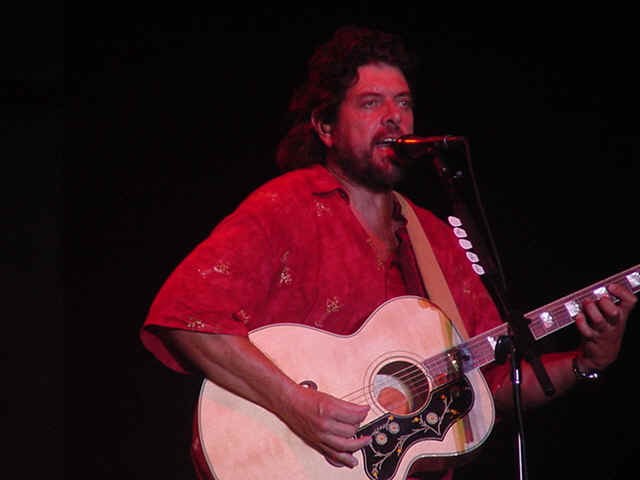
As indicated by its name, the Alan Parsons Project was not a band so much as a concept
overseen by the titular Parsons, a successful producer and engineer. Born in Britain on
December 20, 1949, he began his musical career as a staff engineer at EMI Studios, and
first garnered significant industry exposure via his work on the Beatles' 1969 masterpiece
Abbey Road. Parsons subsquently worked with Paul McCartney on several of Wings' earliest
albums; he also oversaw recordings from Al Stewart, Cockney Rebel and Pilot, but
solidified his reputation by working on Pink Floyd's Dark Side of the Moon.
Influenced by his work on Stewart's concept album Time Passages, Parsons decided to
begin creating his own thematic records; along with songwriter Eric Woolfson, he soon
founded the Alan Parsons Project. Although Parsons played keyboards and infrequently sang
on his records, the Project was designed primarily as a forum for a revolving collection
of vocalists and session players - among them Arthur Brown, ex-Zombie Colin Blunstone,
Cockney Rebel's Steve Harley, the Hollies' Allan Clarke and guitarist Ian Bairnson - to
interpret and perform Parsons and Woolfson's conceptually-linked, lushly-synthesized
music.
The Project debuted in 1975 with Tales of Mystery and Imagination, a collection
inspired by the work of Edgar Allen Poe; similarly, the science fiction of Isaac Asimov
served as the raw material for 1977's follow-up I, Robot. With 1980's The Turn of a
Friendly Card, a meditation on gambling, the Alan Parsons Project scored a Top 20 hit,
"Games People Play; " 1982's Eye in the Sky, was their most successful effort,
and notched a Top Three hit with its title track. While 1984's Ammonia Avenue went gold,
the Project's subsequent LPs earned little notice, although records like 1985's Vulture
Culture, 1987's Gaudi and 1996's On Air found favor with longtime fans. Time Machine
followed in 1999.
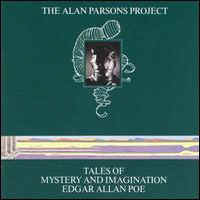
Tales Of Mystery And Imagination - 1975
Tales of Mystery and Imagination is an extremely mesmerizing aural journey through some
of Edgar Allan Poe's most renowned works. With the use of synthesizers, drums, guitar, and
even a glockenspiel, Parsons' shivering effects make way for an eerie excursion into Poe's
well-known classics. The instrumental "Dream Within a Dream" has Orson Welles
narrating in front of this wispy collaboration of guitars and keyboards. The EMI vocoder
is used throughout "The Raven" with the Westminister City School Boys Choir
mixed in to add a distinct flair to it's chamber-like sound. Parsons' expertise surrounds
this album, from the slyness that prevails in "(The System Of) Doctor Tarr and
Professor Feather" to the bodeful thumping of the drums that imitate a heartbeat on
"The Tell-Tale Heart." "The Fall of the House of Usher" is a lengthy
but dazzling array of musicianship that keeps the album's persona in tact, while enabling
the listener to submerge into it's frightening atmosphere. With vocalists Terry Sylvester,
John Miles, and Eric Woolfson stretched across each track, this variety of different
singing styles adds color and design to the album's air. Without any underlying theme to
be pondered upon, Alan Parsons instead paints a vivid picture of one of the most alluring
literary figures in history by musically reciting his most famous works in expert fashion.
- Mike DeGagne
1 - (4:19) A Dream Within A Dream
2 - (3:57) The Raven
3 - (4:45) The Tell-Tale Heart
4 - (4:36) The Cask Of Amontillado
5 - (6:51) The System Of Doctor Tarr And Professor Fether
6 - (13:51) Fall Of The House Of Usher
7 - (4:49) To One In Paradise

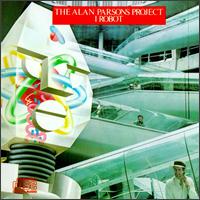
I Robot - 1977
With its title originating from an Isaac Asimov novel, I Robot's main concept is one
that deals heavily in the field of science fiction. The album's idea is based around
Parsons' concern with the onslaught of machinery and its inevitable takeover of man, both
in a physical sense and a spiritual one. As one of the Alan Parsons Project's strongest
efforts, its wise blend of keyboard-dominated instrumentals partnered with the warmth of
the vocals during the lyrical songs emblazons the man-vs.-machine idea. The
mechanical-sounding title track is the opening song, setting the tone for the album's
futuristic motif. Man's regret for his mechanical creations sweeps through "I
Wouldn't Want to Be Like You," with a passionate Lenny Zakatek singing lead. The
human being's rebellious nature is the theme behind "Breakdown," sung by
ex-Hollies member Allan Clarke, while the strength of the human will is the focal point of
"Don't Let It Show," a heartening ballad performed by Dave Townsend. Ending with
the instrumental "Genesis Ch. 1 V. 32," the promising tempo and air of this song
invoke hope for all mankind. As a final product, I Robot leaves the listener with much to
contemplate, which is its purpose, but also presents a collage of well-crafted songs that
aren't easily forgotten. This album still remains one of this band's most accomplished
pieces. - Mike DeGagne
01 - (6:03) I Robot
02 - (3:24) I Wouldn't Want to Be Like You
03 - (4:07) Some Other Time
04 - (3:54) Breakdown
05 - (4:26) Don't Let It Show
06 - (5:26) The Voice
07 - (3:23) Nucleus
08 - (3:58) Day After Day (The Show Must Go On)
09 - (3:14) Total Eclipse
10 - (3:26) Genesis CH. 1 V. 32

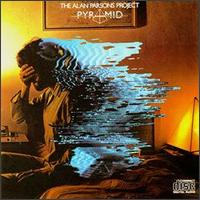
Pyramid - 1978
Even with six different vocalists lending their talents to the album, Pyramid still
remains an average bit of material from the Alan Parsons Project. Not only does the
album's theme evolve around the mystique of the pyramid, but it also touches on man's
fascination with superstition and its powers. The instrumental "Voyager" opens
things up, and its provocative style sets the tone for the album's supernatural mood. The
bright-sounding "What Goes Up" is one of the highlights here, as is "The
Eagle Will Rise Again," sung by Colin Blunstone. The anxiety-ridden
"Pyramania" enhances the album's concept the best, accompanied by some excitable
keyboard playing and a friendly middle. The lesson-learning "Can't Take It With
You" teaches that our souls are our most important asset, in typical Parsons-type
charm. While not a stellar album, Pyramid completes the task of musically explaining its
concept. Its short but slightly compelling nature grows after a few listens, but the album
itself isn't a necessity. - Mike DeGagne
1 - (2:18) Voyager
2 - (4:02) What Goes Up
3 - (4:04) The Eagle Will Rise Again
4 - (4:23) One More River
5 - (5:04) Can't Take It With You
6 - (5:35) In The Lap Of The Gods
7 - (2:49) Pyramania
8 - (4:26) Hyper-Gamma-Spaces
9 - (5:33) Shadow Of A Lonely Man

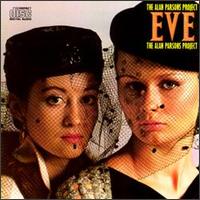
Eve - 1979
For the most part, 1979's Eve is somewhat overlooked as being one of The Alan Parsons
Project's finest work, when in fact it involves some of this group's most intricate songs.
The album's concept deals with the female's overpowering effect on man. Each song touches
on her ability to dissect the male ego, especially through sexual means, originating with
Eve's tempting Adam in the beginning of time. Not only does this idea gain strength as the
album progresses, but a musical battle of the sexes begins to arise through each song. The
gorgeous "You Won't Be There" spotlights man's insecurity. Sung by Dave
Townsend, it's melodramatic feel sets a perfect tone. The classically enhanced
"Winding Me Up" follows suit, based on a woman's ability to dominate her mate
and opening up with sound of a wind-up doll being cranked. Other gems include the bitter
but forceful "Damned If I Do" sung by Lenny Zakatek, and the dominating fury of
"Lucifer," a powerful instrumental. Even the loutish "You Lie Down With
Dogs" bears wit with it's gender inclined mud-slinging. The female vocalists, Lesley
Duncan and Clare Torry do a splendid job of representing the females point of view
throughout the album. Not only does Eve solidify it's main idea, but the songs are highly
entertaining with catchy rhythms and intelligent lyrics. Musically, the tempo appealingly
switches back and forth from slow to quick, as does the temperament of the album. Somehow,
Eve is dismissed as one of this band's greatest efforts, when in fact it's one of their
finest marriages of both concept and music. - Mike DeGagne
1 - (5:07) Lucifer
2 - (3:50) You Lie Down With Dogs
3 - (3:55) I'd Rather Be A Man
4 - (3:35) You Won't Be There
5 - (4:06) Winding Me Up
6 - (4:51) Damned If I Do
7 - (3:38) Don't Hold Back
8 - (4:44) Secret Garden
9 - (5:45) If I Could Change Your Mind

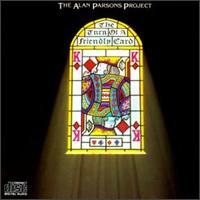
The Turn Of A Friendly Card - 1980
With two of the Alan Parsons Project's best songs, the lovely ballad "Time"
and the wavy-sounding "Games People Play," The Turn of a Friendly Card remains
one of this group's most enjoyable albums. Parsons' idea, the subject of the album's six
tracks, centers around the age-old temptation of gambling and its stranglehold on the
human psyche. On "Games People Play," vocalist Lenny Zakatek sounds compelling
and focused, giving the song a seriousness that aids in realization of the album's
concept. With "Time," it is Eric Woolfson who carries this luxurious-sounding
ode to life's passing to a place above and beyond any of this band's other slower
material. The breakdown of human willpower and our greedy tendencies are highlighted in
the last track, entitled "The Turn of a Friendly Card," which is broken into
five separate parts. "Snake Eyes," sung by Chris Rainbow, is the most compelling
of the five pieces, and ties together the whole of the recording. As in every Parsons
album, an instrumental is included, in this case an interesting number aptly titled
"The Gold Bug." Like most of the band's instrumentals, its flow and rhythm
simulate the overall tempo and concept of the album, acting as a welcome interlude.
Although short, The Turn of a Friendly Card is to the point and doesn't let down when it
comes to carrying out its idea. - Mike DeGagne
1 - (5:01) May Be A Price To Pay
2 - (4:24) Games People Play
3 - (5:03) Time
4 - (5:00) I Don't Wanna Go Home
5 - (4:36) The Gold Bug
6 - (16:24) The Turn Of A Friendly Card

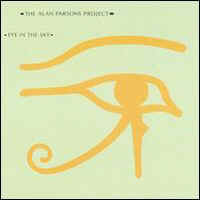
Eye In The Sky - 1982
The fusion of Parsons' thematic intentions and exquisitely textured music comes to
fruition on 1982's Eye in the Sky. On no other album by this group is there such a tight
amalgamation of music, lyrics, and ideas, all combining to create songs that are
accessible to a vast audience. Peaking at number three on Billboard's Top 40, "Eye in
the Sky" is a prime example of a fabulous rock song, highlighted by the harmonic
beauty of Eric Woolfson. The album deals with the futuristic outlook of how our lives will
be constantly monitored by "Big Brother" and the manner in which man's right for
freedom and choice may someday be thwarted by the government, or the powers that be. Aside
from Parsons' intriguing concept, the individual songs serve a dual purpose by carrying
out the album's message while at the same being perfect examples of well-crafted rock. The
up-and-down flow of the instrumental "Sirius" is astonishing, and is used wisely
as the opening track. "Mammagamma" is another instrumental that brandishes the
group's trademarked mysteriousness, wrapped in an ominous science fiction-type glow.
"Psychobabble" is a cerebral rock song that best represents the album's concept,
while the softness of "Old and Wise" sums up the threatening result that may
someday evolve, with a hint of promise for a favorable outcome. With a powdery feel and
pristine sound, Eye in the Sky is worthy of both amiable songs and conceptual substance,
something not found on all of the Alan Parsons Project's albums. - Mike DeGagne
01 - (1:56) Sirius [Instrumental]
02 - (4:34) Eye In The Sky
03 - (4:56) Children Of The Moon
04 - (2:13) Gemini
05 - (7:15) Silence And I
06 - (4:22) You're Gonna Get Your Fingers Burned
07 - (4:54) Psychobabble
08 - (3:38) Mammagamma [Instrumental]
09 - (3:52) Step By Step
10 - (4:48) Old And Wise

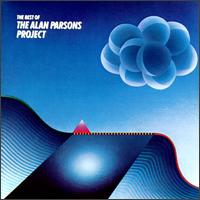
The Best Of Alan Parsons Project - 1983
The 12 tracks that appear on The Best of the Alan Parsons Project include some of their
greatest singles, like "I Wouldn't Want to Be Like You" from 1977's I Robot and
the inducing "Games People Play" off of The Turn of a Friendly Card. Even though
these songs are splendid all by themselves, they seem to lose their conceptual weight when
taken away from their original albums. As singles, they do act as a fine representation of
how The Alan Parsons Project's music sounds and conveys its mysterious air, but even with
a dozen singles on this album there's just too much of their other worthy material that is
sadly left off. Present is their biggest single and most alluring piece, "Eye in the
Sky," from the album of the same name, and the entrancing "Time" from Turn
of a Friendly Card. "Pyramania" and "You Don't Believe," representing
both Pyramid and Ammonia Avenue, are also included, as are some of their finest ballads
with "Old and Wise" and "Don't Let It Show." "Lucifer" is
the only instrumental on the collection, but is also one of their most sophisticated. As a
short reference to this group's earlier material, The Best of the Alan Parsons Project
offers some of their greatest work, but it's too short to really serve as a true best-of.
Each individual album should be listened to in order to grasp the entirety of Parsons'
themes. The Best of the Alan Parsons Project, Vol. 2 should be partnered with Volume 1 for
a more concise set. - Mike DeGagne
01 - (3:14) I Wouldn't Want To Be Like You
02 - (4:38) Eye In The Sky
03 - (4:21) Games People Play
04 - (5:01) Time
05 - (2:45) Pyramania
06 - (4:30) You Don't Believe
07 - (4:13) Lucifer [Instrumental]
08 - (4:53) Psychobabble
09 - (3:36) Damned If I Do
10 - (3:34) Don't Let It Show
11 - (4:46) Can't Take It With You
12 - (4:10) Old And Wise

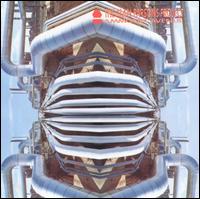
Ammonia Avenue - 1984
One of the most interesting aspects about the Alan Parsons Project is the band's
ability to forge a main theme with each of its songs, while at the same time sounding
extremely sharp and polished. Much of this formula is used in Ammonia Avenue, only this
time the songs rise above Parsons' overall message due to the sheer beauty of the lyrics
partnered with the luster of the instruments. The album touches upon how the lines of
communication between people are diminishing, and how we as a society grow more
spiritually isolated and antisocial. But aside from the philosophical concepts prevalent
in the lyrics, it is the music on this album that comes to the forefront. The enchanting
saxophone of Mel Collins on "Don't Answer Me" adds to its lonely atmosphere,
while the briskness of Eric Woolfson's wording throughout "Prime Time" makes it
one of the Project's best singles. On "You Don't Believe," the seriousness of
the lyrics works well with the song's energetic pace. The subtlety of the ballad comes to
life on the elegant "Since the Last Goodbye," which focuses on a failed attempt
at a relationship. With Ammonia Avenue, the sum of the parts is greater than the whole
product, which can't be said for all of the Alan Parsons Project's albums. Vocalists Eric
Woolfson, Chris Rainbow, Lenny Zakatek, and Colin Blunstone equally shine, placing their
talents above and beyond the album's main idea. - Mike DeGagne
1 - (5:08) Prime Time
2 - (3:24) Let Me Go Home
3 - (3:40) One Good Reason
4 - (4:39) Since The Last Goodbye
5 - (4:17) Don't Answer Me
6 - (4:27) Dancing On A High Wire
7 - (4:31) You Don't Believe
8 - (4:00) Pipeline
9 - (6:36) Ammonia Avenue

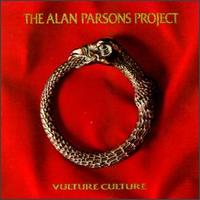
Vulture Culture - 1985
Vulture Culture's theme is another in which the fallacy of humankind is front and
center. This time Parsons' message concerns the fact that everyone lives in a parasitic
society, where it's every man for himself. Those who can't fend for themselves simply
won't survive in a world where the kindness of the human spirit is rapidly deteriorating.
On this album, though, the songs are weaker and are less effective in bringing out the
album's complex idea. As it does have it's moments, Vulture Culture lacks in cohesiveness
and strength both lyrically and, to a lesser extent, musically. "Let's Talk About
Me" addresses the theme in its words, but the choppy rhythm takes away the
attractiveness that could have been. The instrumental "Hawkeye" adds life and
contrast to the album at just the right time. The most appealing song, "Days Are
Numbers (The Traveller)" with vocalist Chris Rainbow at the helm, combines simplicity
with a timeless chorus making for a truly beautiful ballad. Even though Parsons' theme is
revealed, it's done so with less clarity and doesn't quite hit home. Without the usual
balance of absorbing lyrics and well-maintained music, Vulture Culture remains one of this
band's less prolific albums. - Mike DeGagne
1 - (4:33) Let's Talk About Me
2 - (5:03) Seperate Lives
3 - (4:35) Days Are Numbers (The Traveller)
4 - (4:29) Sooner Or Later
5 - (5:26) Vulture Culture
6 - (3:52) Hawkeye
7 - (4:58) Somebody Out There
8 - (5:27) The Same Old Sun

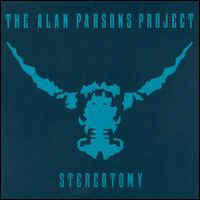
Stereotomy - 1985
It seems as though the Alan Parsons Project's conceptual grandeur began to lose its
potency right around the mid-'80's. With Stereotomy, the message that Parsons is trying to
reveal by way of his music begins to dissipate quickly, and the album is saved only
somewhat by a couple of interesting instrumental pieces. On this album, the theme circles
around the way in which the modern world molds the personality, the character, and the
livelihood of the human being. People are but a slave to their lifestyle and their
environment, and they are destined to be thrown into this situation at birth, with
tolerance as an inevitability. One must really pay attention to the profound lyrics and
loose structuring of the music to attain the concept that Parsons metaphorically dances
around. John Miles' angriness on the title track kicks things off, and his forceful voice
makes for a passable rock tune. Aside from this song, the only other vocal standout is
"In the Real World," again with the help of Miles' assertiveness. Two of the
album's instrumentals, "Where's the Walrus?" and "Urbania," conjure up
mood and keep the listener slightly poised, causing some musical buoyancy among the
blandness of the other tracks. Stereotomy's main theme remains stagnant, ever so slightly
regaining consciousness across the nine songs laid out here. Parsons's genius can be
better investigated on numerous past releases, as this album proves to come up short. -
Mike DeGagne
1 - (7:20) Stereotomy
2 - (4:28) Beaujolias
3 - (5:03) Urbania (Instrumental)
4 - (4:44) Limelight
5 - (4:20) In The Real World
6 - (6:05) Where's The Walrus? (Instrumental)
7 - (7:58) Light Of The World
8 - (1:02) Chinese Whispers (Instrumental)
9 - (1:23) Stereotomy Two

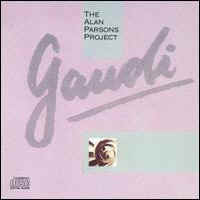
Gaudi - 1987
Even though 1987's Gaudi was inspired by architect Antonio Gaudi, its songs seem to
lack the assertiveness or the instrumental endowments that usually occur within the Alan
Parsons Project's work. With a leaner, edgier sound that is best represented on
"Standing on Higher Ground," the easiness and touch that should have enveloped
this album is noticeably absent. While not a complete failure, the album does reveal some
passion with the last track, "Paseo de Graciad," a finely orchestrated
instrumental done exquisitely in full Parsons style. The usual lineup of Miles, Woolfson,
Zakatek, and Rainbow share the singing duties, with Geoff Barradale taking over on
"Standing on Higher Ground." The songs on the album have difficulty supporting
any imagery or symbolism concerning the album's main character, which was done masterfully
more than ten years earlier with Tales of Mystery and Imagination, a musical voyage
through Edgar Allen Poe's work. Here, the songs stand up well individually, but Parsons is
a conceptual virtuoso who usually ties together his main idea through the use of each
separate song. Although Gaudi isn't without some minor merit, its lasting impression
doesn't leave much regard for its central character. - Mike DeGagne
1 - (8:53) La Sagrada Familia
2 - (4:35) Too Late
3 - (5:58) Closer To Heaven
4 - (5:08) Standing On Higher Ground
5 - (4:31) Money Talks
6 - (6:27) Inside Looking Out
7 - (3:48) Paseo De Gracia [Instrumental]

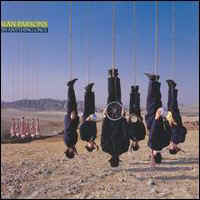
Try Anything Once - 1993
Alan Parsons' Try Anything Once, released in 1993, is made up of beautifully mastered
songs that carry their own charisma, thanks to the numerous vocalists that contribute
throughout the album. No single track rises from among the others, and the final product
actually makes this album work. Singers such as David Pack, Chris Thompson, Eric Stewart,
and Jacqui Copland present each tune with refreshing differentiation and style. There is
no overall concept strewn together on Try Anything Once, but many of the songs touch on
religion and the hope of an afterlife, like "Wine From the Water" and "Turn
It Up." Each song carries its weight with either rich instrumentation or delicate
lyrics, and Parsons' use of puzzling metaphors once again makes for an intriguing
collection of songs. The four instrumentals - "Dreamscape,"
"Breakaway," "Jigue," and "Re-Jigue" - add wonderment and a
classical savoir faire to the album, with "Re-Jigue" benefitting from the
Philharmonia Orchestra. An element of wonder and fascination hovers above songs like
"The Three of Us" and "Mr. Time," and the cloudiness and uncertainty
of Parsons' themes create an attraction to his thought-provoking words. Since his message
is left for the listener to contemplate (unlike past albums that were conceptually blatant
like I Robot or Pyramid), Try Anything Once breeds its own allure and intricacies. The
absence of the word "Project" at the end of his name makes no difference,
because the music and the atmosphere on this album harbor the same mysterious effects as
when it was included. - Mike DeGagne
01 - (5:57) Three Of Me
02 - (6:18) Turn It Up
03 - (5:48) Wine From The Water
04 - (4:11) Breakaway
05 - (8:23) Mr. Time
06 - (3:28) Jigue
07 - (4:43) I'm Talkin' To You
08 - (5:05) Siren Song
09 - (3:05) Dreamscape
10 - (4:43) Back Against The Wall
11 - (2:32) Re-Jigue
12 - (6:35) Oh Life (There Must Be More)

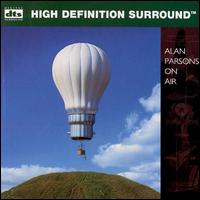
On Air - 1996
With vocalists consisting of Christopher Cross, Neil Lockwood, and Steve Overland, On
Air's sound is smooth and gentle but has difficulty in holding interest, and an even
harder time localizing the theme. This time, Parsons' concept deals with the fascination
of flight and the yearning people have to become one with the sky. As beautiful and
imagery-filled as this idea is, its potential never seems to get off the ground. Most of
the songs on the album lack the intensity or the clout that is necessary to establish any
concern for the main idea. Instead, they consist of metaphorical lyrics that go off on
strange tangents, misconstrued and long-drawn-out stanzas that seem empty, and a slight
pretentiousness that is usually absent from this band's material. The only association
between the concept and the music is the light, breezy feel that carries each song,
simulating an effortless flight through the clouds. Both instrumentals, "Apollo"
and "Cloudbreak," are appealing, and capture the essence of the album more so
than any of the vocally inhabited songs. "Too Close to the Sun" and "So Far
Away" are the album's finer points, but even these songs fall short of the
domineering style that once surrounded the Alan Parsons Project. Most of the songs contain
well-established harmonies and a fair amount of guitar and keyboard mingling, but it's the
lack of depth and assertiveness that holds this album back. - Mike DeGagne
01 - (1:42) Blue Blue Sky
02 - (5:07) Too Close To The Sun
03 - (5:29) Blown By The Wind
04 - (4:43) Cloudbreak [Instrumental]
05 - (4:40) I Can't Look Down
06 - (4:05) Brother Up In Heaven
07 - (4:25) Fall Free
08 - (6:09) Apollo [Instrumental]
09 - (4:11) So Far Away
10 - (6:23) One Day To Fly
11 - (4:26) Blue Blue Sky

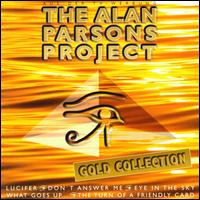
Gold Collection - 2000
Disc 1
01 - (4:13) Don't Answer Me
02 - (4:35) Eye In The Sky
03 - (5:03) Lucifer
04 - (5:05) Prime Time
05 - (3:38) What Goes Up
06 - (4:32) The Gold Bug
07 - (4:55) Psychobabble
08 - (4:24) Let's Talk About Me
09 - (4:22) Games People Play
10 - (5:06) Time
11 - (4:51) Damned If I Do
12 - (4:25) Days Are Numbers (The Traveller)
13 - (4:03) Some Other Time
14 - (2:50) Pyramania
15 - (5:35) Shadow Of A Lonely Man
16 - (4:22) Don't Let It Show
17 - (6:05) I Robot
Disc 2
01 - (2:45) The Turn Of A Friendly Card
02 - (3:27) I Wouldn't Want To Be Like You
03 - (4:44) Limelight
04 - (6:20) Turn It Up
05 - (3:40) Mammagamma
06 - (4:26) The Eagle Will Rise Again
07 - (3:58) I'd Rather Be A Man
08 - (4:58) Children Of The Moon
09 - (4:19) One More River
10 - (5:04) Standing On Higher Ground
11 - (4:38) Seperate Lives
12 - (3:49) Hawkeye
13 - (3:44) You Won't Be There
14 - (5:02) Urbania
15 - (4:33) Too Late
16 - (3:59) Pipeline
17 - (4:36) Since The Last Goodbye

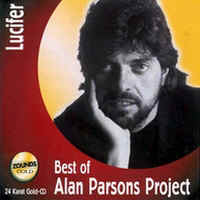
Lucifer: The Best Of The Alan Parsons Project
01 - (4:11) The Raven
02 - (5:30) The Voice
03 - (6:06) I Robot
04 - (3:27) I Wouldn`t Want To Be Like You
05 - (2:47) The Turn Of A Friendly Card [Part1]
06 - (4:41) Eye In The Sky
07 - (4:17) Don`t Answer Me
08 - (5:10) Lucifer
09 - (4:28) Don`t Let It Show
10 - (4:26) The Eagle Will Rise Again
11 - (4:06) Some Other Time
12 - (5:01) Old And Wise
13 - (5:09) Can`t Take It With You
14 - (4:31) The System Of Doctor Tarr And Professor Fether
15 - (7:05) Prelude (The Fall Of The House Of Usher)
16 - (2:43) Arrival (The Fall Of The House Of Usher)
17 - (1:03) Intermezzo (The Fall Of The House Of Usher)
18 - (4:39) Pavane (The Fall Of The House Of Usher)
19 - (0:52) Fall (The Fall Of The House Of Usher)

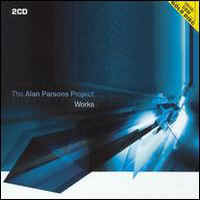
Works - 2002
Disc 1
01 - (6:06) I Robot
02 - (3:27) I Wouldn't Want To Be Like You
03 - (3:56) Breakdown
04 - (4:27) Don't Let It Show
05 - (2:27) Voyager
06 - (3:34) What Goes Up
07 - (4:25) The Eagle Will Rise Again
08 - (5:09) Can't Take It With You
09 - (2:47) Pyramania
10 - (4:55) Damned If I Do
11 - (5:06) Lucifer
12 - (5:53) If I Could Change Your Mind
13 - (2:45) The Turn Of A Friendly Card Pt 1
14 - (3:22) Snake Eyes
15 - (4:28) Games People Play
16 - (5:04) Time
Disc 2
01 - (1:59) Sirius [Instrumental]
02 - (4:40) Eye In The Sky
03 - (4:55) Psychobabble
04 - (3:38) Mammagamma
05 - (5:00) Old And Wise
06 - (5:07) Prime Time
07 - (4:17) Don't Answer Me
08 - (4:29) You Don't Believe
09 - (4:33) Let's Talk About Me
10 - (4:30) Days Are Numbers (The Traveller)
11 - (7:07) Stereotomy
12 - (4:23) In The Real World
13 - (5:51) Standing On Higher Ground
14 - (4:35) Too Late
15 - (6:17) Turn It Up
16 - (2:31) Re-Jigue [Instrumental]

|